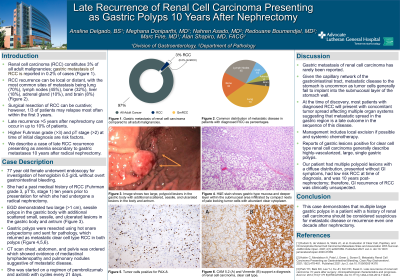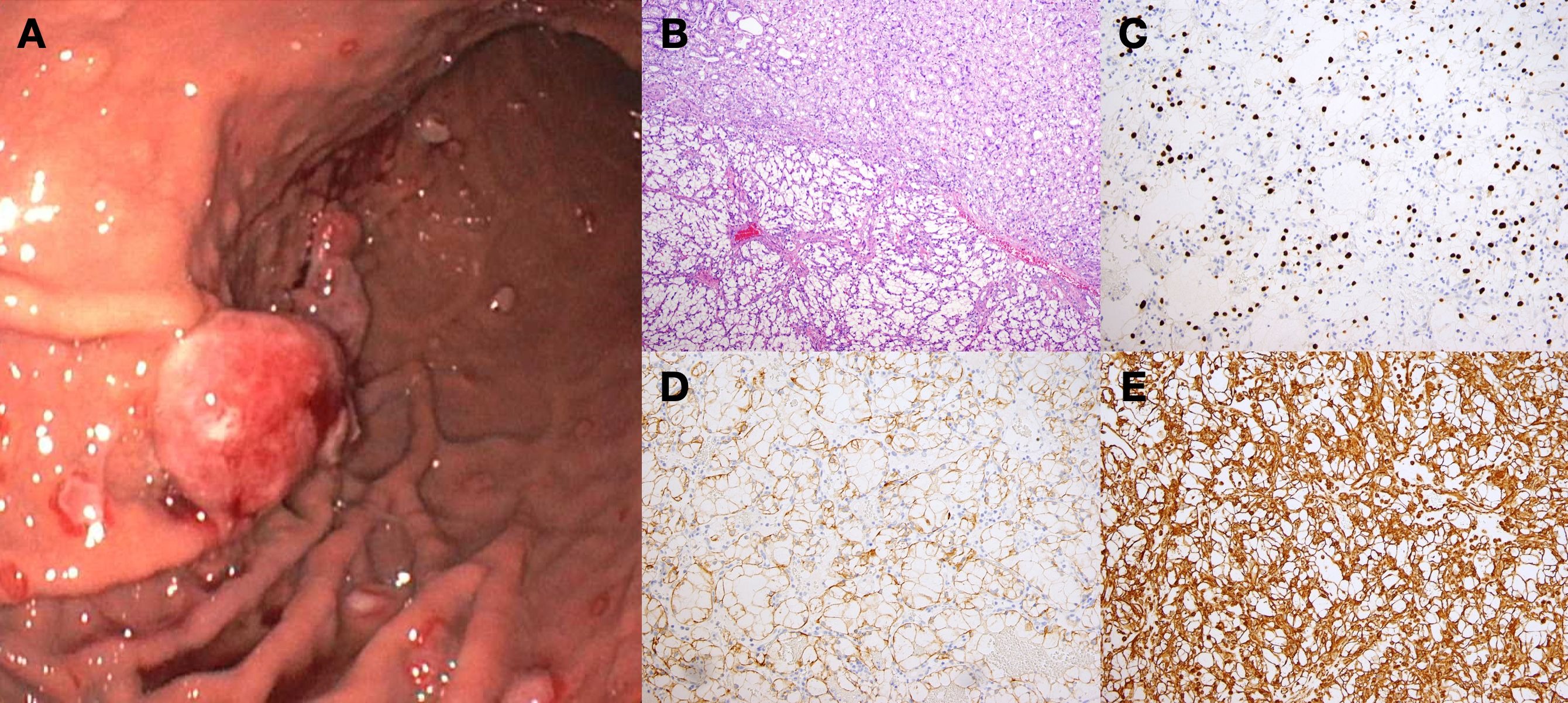Back


Poster Session A - Sunday Afternoon
Category: Stomach
A0730 - Late Recurrence of Renal Cell Carcinoma Presenting as Gastric Polyps 10 Years After Nephrectomy
Sunday, October 23, 2022
5:00 PM – 7:00 PM ET
Location: Crown Ballroom

Has Audio

Analine Delgado, BS
Advocate Lutheran General Hospital
Park Ridge, IL
Presenting Author(s)
Analine Delgado, BS1, Meghana Doniparthi, MD1, Nahren Asado, MD1, Redouane Boumendjel, MD1, Marc Fine, MD1, Alan Shapiro, MD, FACG2
1Advocate Lutheran General Hospital, Park Ridge, IL; 2Advocate Lutheran General Hospital, Glenview, IL
Introduction: Surgical resection of renal cell carcinoma (RCC) can be curative; however, 20-30% of patients may experience relapse most often within 3 years of nephrectomy. Late recurrence of RCC, beyond 5 years after nephrectomy, can occur in up to 10% of patients. Higher Fuhrman grade ( >3) and pT stage ( >2) at time of initial diagnosis are risk factors. Recurrence can be local or distant, with the most common sites of metastasis being lung (70%), lymph nodes (45%), bone (32%), liver (18%), adrenal gland (10%), and brain (8%). Gastric metastasis has rarely been reported. We describe a case of late RCC recurrence presenting as anemia secondary to gastric metastases 10 years after radical nephrectomy.
Case Description/Methods: A 77-year-old female presented with fatigue and dyspnea on exertion. She had a past medical history of RCC (Fuhrman grade 3, pT1b, stage 1) ten years prior to presentation for which she had undergone a radical nephrectomy. She was found to have hemoglobin of 6.5 with MCV 76.4. She denied overt gastrointestinal bleeding. EGD demonstrated two >1 cm sessile polyps in the gastric body with additional scattered small, sessile and ulcerated lesions in the body and antrum (Fig 1A). The large polyps were resected using hot snare polypectomy. Colonoscopy was unremarkable. Pathology revealed metastatic RCC, clear cell type, in both polyps, positive for CAM 5.2, CD10, vimentin, and PAX-8 and negative for CK 7, CK 20, and CDX-2 (Fig 1B, 1C, 1D, 1E). CT showed mediastinal lymphadenopathy and pulmonary nodules suggestive of multiple sites of metastasis. She was started on a regimen of pembrolizumab and axitinib.
Discussion: Gastric metastasis of RCC is rare, reported to occur in 0.2% of cases, and concomitant lesions are frequently found in other sites, suggesting metastatic spread to the stomach may be a late outcome. Metastasis in the stomach typically appears as a single, large mass or ulcer whereas our patient had multiple polypoid lesions and a diffuse distribution. Management includes local excision if possible and systemic chemotherapy. Our patient presented without GI symptoms, had relatively low risk RCC at time of diagnosis, and was 10 years post-nephrectomy; therefore, GI recurrence of RCC was clinically unsuspected. This case demonstrates that multiple large gastric polyps in a patient with a history of renal cell carcinoma should be considered suspicious for metastatic disease or recurrence even one decade after nephrectomy.

Disclosures:
Analine Delgado, BS1, Meghana Doniparthi, MD1, Nahren Asado, MD1, Redouane Boumendjel, MD1, Marc Fine, MD1, Alan Shapiro, MD, FACG2. A0730 - Late Recurrence of Renal Cell Carcinoma Presenting as Gastric Polyps 10 Years After Nephrectomy, ACG 2022 Annual Scientific Meeting Abstracts. Charlotte, NC: American College of Gastroenterology.
1Advocate Lutheran General Hospital, Park Ridge, IL; 2Advocate Lutheran General Hospital, Glenview, IL
Introduction: Surgical resection of renal cell carcinoma (RCC) can be curative; however, 20-30% of patients may experience relapse most often within 3 years of nephrectomy. Late recurrence of RCC, beyond 5 years after nephrectomy, can occur in up to 10% of patients. Higher Fuhrman grade ( >3) and pT stage ( >2) at time of initial diagnosis are risk factors. Recurrence can be local or distant, with the most common sites of metastasis being lung (70%), lymph nodes (45%), bone (32%), liver (18%), adrenal gland (10%), and brain (8%). Gastric metastasis has rarely been reported. We describe a case of late RCC recurrence presenting as anemia secondary to gastric metastases 10 years after radical nephrectomy.
Case Description/Methods: A 77-year-old female presented with fatigue and dyspnea on exertion. She had a past medical history of RCC (Fuhrman grade 3, pT1b, stage 1) ten years prior to presentation for which she had undergone a radical nephrectomy. She was found to have hemoglobin of 6.5 with MCV 76.4. She denied overt gastrointestinal bleeding. EGD demonstrated two >1 cm sessile polyps in the gastric body with additional scattered small, sessile and ulcerated lesions in the body and antrum (Fig 1A). The large polyps were resected using hot snare polypectomy. Colonoscopy was unremarkable. Pathology revealed metastatic RCC, clear cell type, in both polyps, positive for CAM 5.2, CD10, vimentin, and PAX-8 and negative for CK 7, CK 20, and CDX-2 (Fig 1B, 1C, 1D, 1E). CT showed mediastinal lymphadenopathy and pulmonary nodules suggestive of multiple sites of metastasis. She was started on a regimen of pembrolizumab and axitinib.
Discussion: Gastric metastasis of RCC is rare, reported to occur in 0.2% of cases, and concomitant lesions are frequently found in other sites, suggesting metastatic spread to the stomach may be a late outcome. Metastasis in the stomach typically appears as a single, large mass or ulcer whereas our patient had multiple polypoid lesions and a diffuse distribution. Management includes local excision if possible and systemic chemotherapy. Our patient presented without GI symptoms, had relatively low risk RCC at time of diagnosis, and was 10 years post-nephrectomy; therefore, GI recurrence of RCC was clinically unsuspected. This case demonstrates that multiple large gastric polyps in a patient with a history of renal cell carcinoma should be considered suspicious for metastatic disease or recurrence even one decade after nephrectomy.

Figure: Figure 1. A 77 year old female underwent endoscopy for investigation of anemia and was found to have two large, polypoid lesions in the gastric body with smaller scattered, ulcerated lesions in the body and antrum (A). H&E stain image shows gastric type mucosa and deeper layer within the submucosal area infiltrated by compact nests of pale looking tumor cells with abundant clear cytoplasm (B). Positive PAX8 (C), CAM 5.2 (D) and Vimentin (E) support a diagnosis of renal cell carcinoma, clear cell type.
Disclosures:
Analine Delgado indicated no relevant financial relationships.
Meghana Doniparthi indicated no relevant financial relationships.
Nahren Asado indicated no relevant financial relationships.
Redouane Boumendjel indicated no relevant financial relationships.
Marc Fine indicated no relevant financial relationships.
Alan Shapiro indicated no relevant financial relationships.
Analine Delgado, BS1, Meghana Doniparthi, MD1, Nahren Asado, MD1, Redouane Boumendjel, MD1, Marc Fine, MD1, Alan Shapiro, MD, FACG2. A0730 - Late Recurrence of Renal Cell Carcinoma Presenting as Gastric Polyps 10 Years After Nephrectomy, ACG 2022 Annual Scientific Meeting Abstracts. Charlotte, NC: American College of Gastroenterology.
